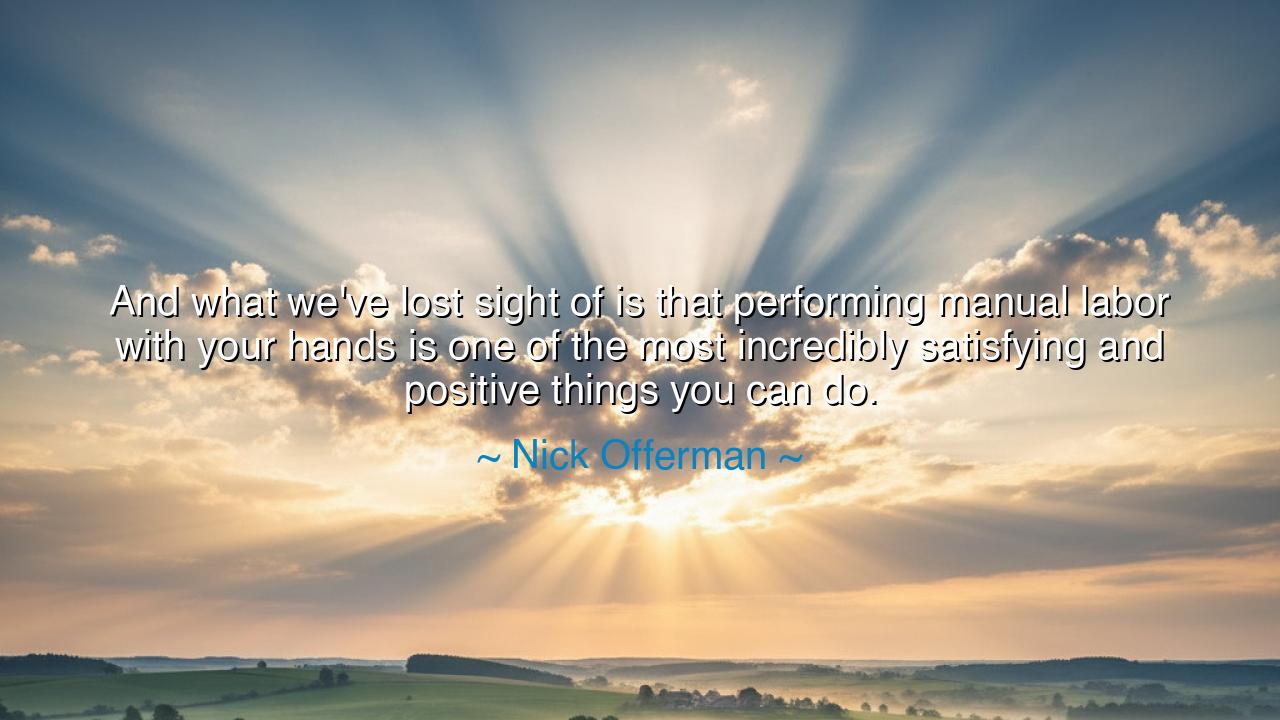
And what we've lost sight of is that performing manual labor
And what we've lost sight of is that performing manual labor with your hands is one of the most incredibly satisfying and positive things you can do.






Hear the voice of Nick Offerman, craftsman and storyteller, who declared: “And what we’ve lost sight of is that performing manual labor with your hands is one of the most incredibly satisfying and positive things you can do.” These words are not merely about work but about the sacred union of body and spirit, about the forgotten joy that lies in creating something real and tangible. For in the age of machines and screens, many have grown distant from the earth, from wood, from stone, from the rhythm of toil that binds humanity to its roots.
To work with the hands is to return to the primal dignity of being human. It is to feel the rough grain of wood and shape it into form, to dig the soil and watch it yield life, to hammer iron and see it bend to will. Such labor is not only physical—it is deeply satisfying, for it gives the soul proof of its power to create, to shape, to bring forth order from chaos. Offerman reminds us that in forgetting this, we have lost a pathway to joy.
Consider the story of George Washington Carver, born into slavery, yet through his hands and mind, he discovered hundreds of uses for the peanut, the sweet potato, and other crops. His manual labor in the soil was not beneath him but exalted him, for it revealed to him secrets of creation that blessed the lives of many. His work proves that labor, when embraced with love and purpose, becomes more than survival—it becomes art, discovery, and service to mankind.
So too in the life of Mahatma Gandhi, who took up the spinning wheel as both symbol and practice. He urged his people to weave their own cloth, to honor the dignity of their hands and free themselves from dependence on foreign goods. This simple act of labor became a revolution, binding a nation together. Gandhi understood, as Offerman proclaims, that manual work carries a profound satisfaction, for it nourishes both the worker and the world.
The meaning of Offerman’s words is thus: modern life, with its conveniences and digital illusions, often blinds us to the deep joy of tangible creation. We mistake ease for happiness and efficiency for fulfillment. Yet true contentment often comes not from consumption, but from creation. To use the hands is to awaken a forgotten harmony, to root oneself in reality, and to discover the quiet pride that rises when the work of the day can be seen, touched, and admired.
The lesson for us is clear: do not flee from labor, nor despise it as something beneath you. Seek out tasks that let your hands shape the world—gardening, cooking, crafting, repairing. Each of these is a chance to reconnect with yourself, to rediscover the positive power of creation. Such work need not be grand to be meaningful. Even the simplest act—building a shelf, baking bread, planting a seed—can bring satisfaction that no idle comfort can provide.
Practical wisdom calls us to three acts. First, each week, dedicate time to some form of manual labor, no matter how small. Second, honor those who labor with their hands—farmers, builders, artisans—for they carry wisdom modern life often forgets. Third, remember that creation is medicine for the restless soul: when anxiety or despair weighs heavy, return to the workbench, the garden, or the kitchen, and let your hands remind you of your power.
So let it be remembered: to work with the hands is not a burden but a blessing, one of the most satisfying and positive gifts life offers. Nick Offerman’s words are a call to return to simplicity, to remember that fulfillment is not always found in wealth or status, but in the quiet joy of shaping, building, and creating. Let us take up this wisdom, that we may once again find pride, peace, and meaning in the labor of our own two hands.






MNLuong Thi Minh Nguyet
I like how this quote reframes manual labor as something joyful and meaningful instead of merely functional. It challenges the idea that intellectual or digital work is superior. Still, I wonder if this satisfaction comes from the physical activity itself or from seeing the direct results of one’s effort. Maybe the deeper lesson is that humans need to create — whether with hands, tools, or ideas — to feel fulfilled.
TNDuc Tai Ngo
I find this observation really thought-provoking. It makes me question why so many people feel disconnected or restless despite having comfortable lives. Maybe part of the answer is that we’ve replaced hands-on creation with digital consumption. Do you think schools and workplaces should reintroduce more opportunities for practical, tactile learning — not just as a skill, but as a way to promote mental well-being?
TBPham Thai Bao
This statement makes me nostalgic in a way. It reminds me of how fulfilling it can be to garden, build, or even cook — simple acts that involve touch and presence. But I wonder, have we lost appreciation for this kind of work because it’s often associated with lower economic status? Maybe we need to rethink how we define ‘value’ and recognize the emotional satisfaction that comes from physical craftsmanship.
TTTinh Thanh
I really connect with this sentiment because it feels like we’ve grown distant from the physical side of work in today’s digital world. There’s something grounding about creating or fixing something with your own hands — it gives a sense of tangible accomplishment that’s often missing in office or screen-based jobs. Do you think modern society undervalues manual labor because of technology and status-driven definitions of success?